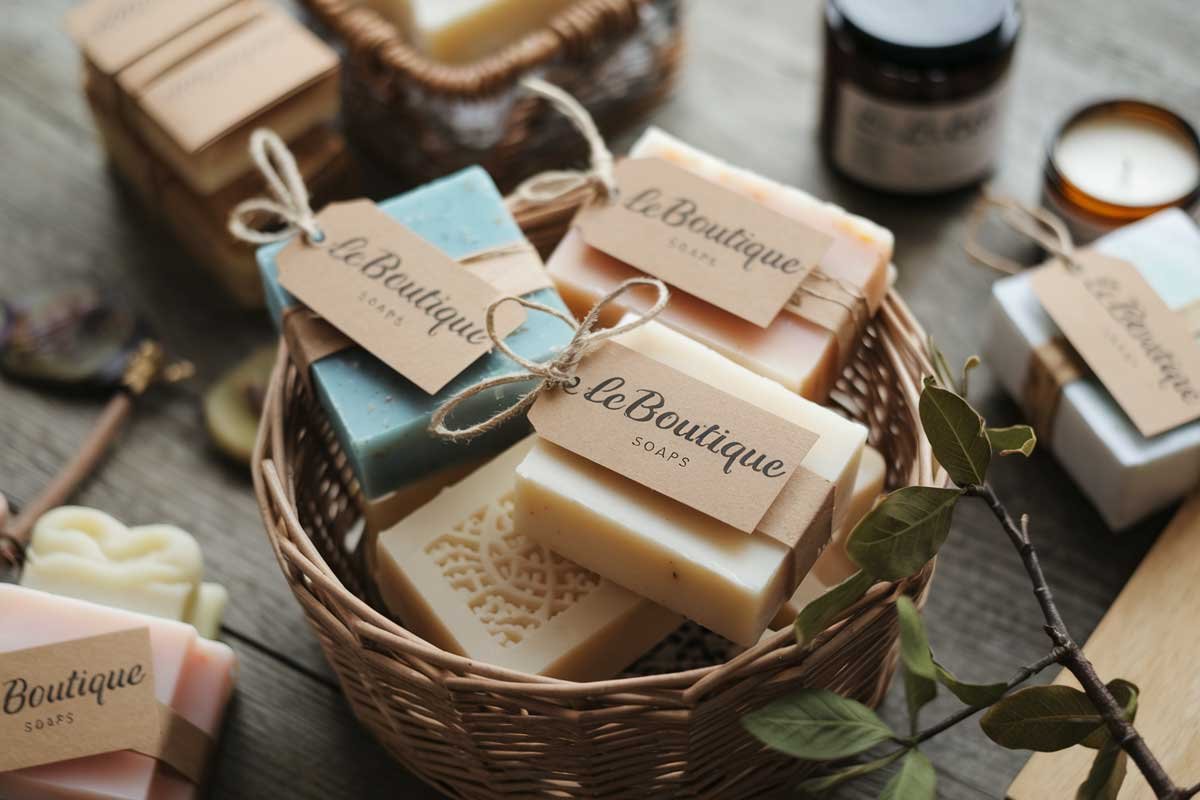When it comes to soap, not all bars are created equal. The differences between handmade vs commercial soap go far beyond just how they’re made. Handmade soap typically contains natural ingredients like essential oils, herbs, and plant-based oils carefully selected for their skin benefits, while commercial soap often includes synthetic detergents, artificial fragrances, and preservatives that can strip your skin of natural oils. This fundamental difference affects everything from how your skin feels after washing to the environmental impact of your daily cleansing routine.
Many people believe commercial soaps are just as good for your skin because they’re regulated and widely available. However, handmade soap offers personalized skincare benefits that mass-produced options simply can’t match. While commercial brands prioritize cost-efficiency and shelf life, artisanal soap makers focus on quality ingredients that nourish your skin rather than just cleaning it.
Key Takeaways
- Handmade soap contains natural ingredients that nourish your skin, while commercial soaps often use synthetic chemicals that can cause dryness and irritation.
- The glycerin naturally produced during soapmaking is typically retained in handmade soaps but removed from commercial bars for use in other profitable products.
- Supporting artisanal soap makers benefits your skin health, reduces environmental impact, and strengthens local economies.
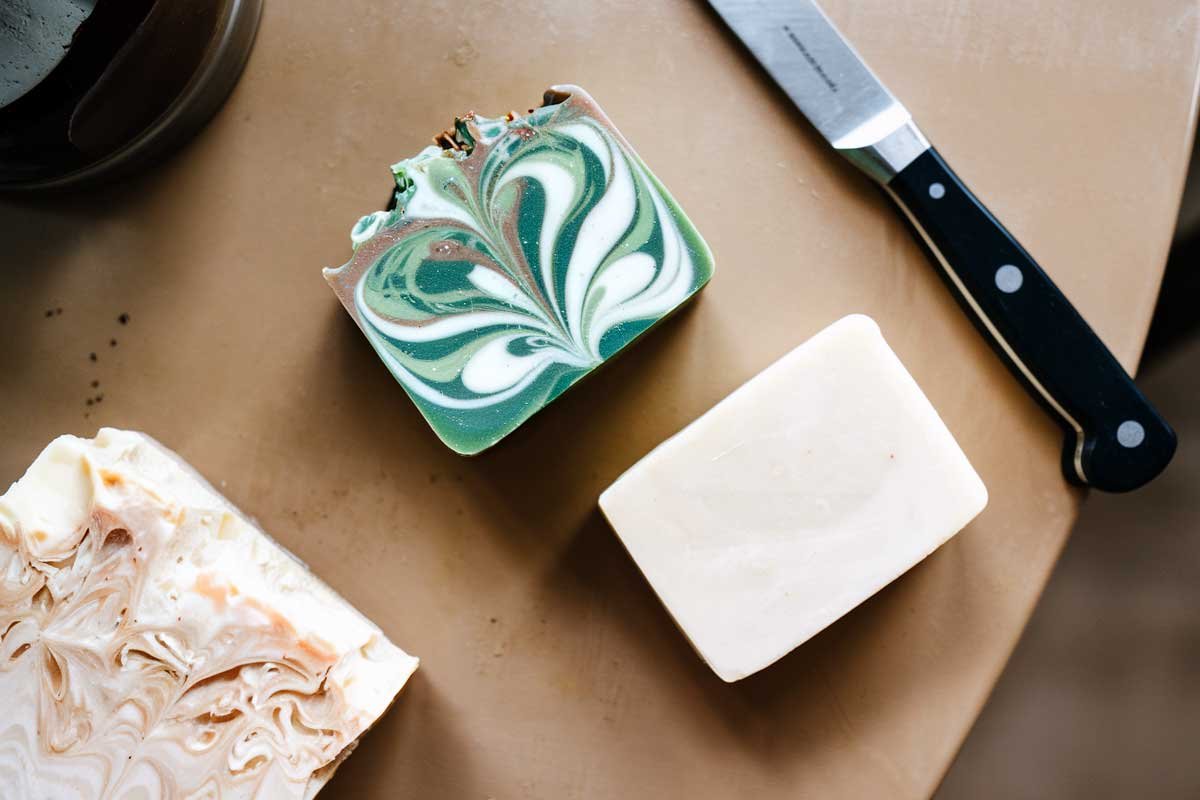
Understanding Soap Fundamentals
Soap creation involves a specific chemical process and ingredient selection that directly impacts its quality and effect on your skin. The ingredients in the soap you use daily matter more than you might realize.
The Art of Saponification
Saponification is the chemical reaction that creates soap. This process occurs when oils or fats mix with an alkali solution (typically sodium hydroxide or lye). When these ingredients combine, they trigger a transformation that converts the oils into soap and glycerin.
The saponification process takes time—usually 24-48 hours for the initial reaction, but handmade soaps often cure for 4-6 weeks to complete the process fully. During curing, excess water evaporates, creating a harder, longer-lasting bar.
In commercial soap manufacturing, the glycerin (a natural moisturizer) is typically removed and sold separately for other products. Handmade soap retains this valuable byproduct, which helps explain why it feels more moisturizing on your skin.
Natural vs. Synthetic Ingredients
The ingredient list represents the most significant difference between handmade and commercial soaps. Handmade soaps feature natural ingredients like:
- Plant-based oils (olive, coconut, shea butter)
- Essential oils for fragrance
- Herbs, clays, and botanicals for color and properties
- Natural exfoliants like oatmeal or seeds
Commercial soaps often contain synthetic additives such as:
- Petroleum-based detergents
- Artificial fragrances and colors
- Preservatives like parabens
- Sodium lauryl sulfate (SLS)
These synthetic components help extend shelf life and reduce production costs but may irritate sensitive skin. Your skin absorbs what you put on it, making ingredient quality crucial for overall skin health.
Key Ingredient Differences
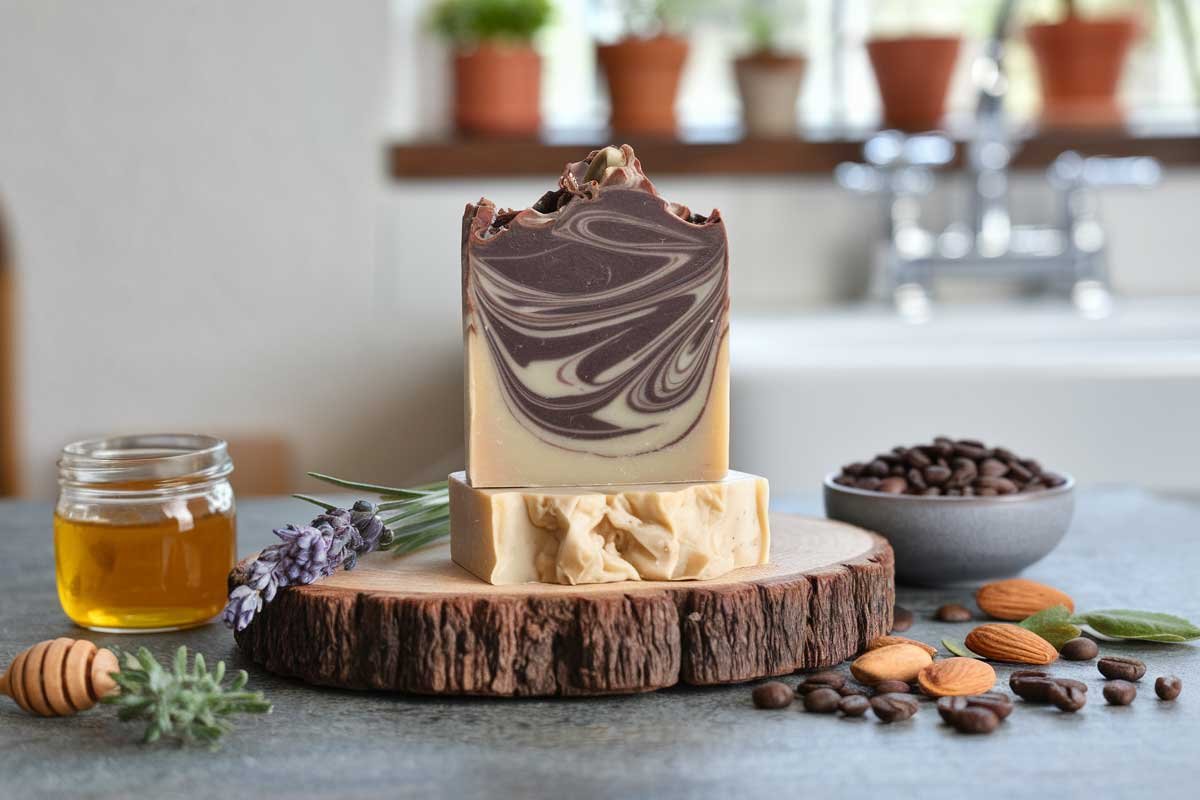
The ingredients in soap affect how it cleans, feels on your skin, and impacts your health. Commercial and handmade soaps differ significantly in what they contain and how they’re processed.
Role of Glycerin in Moisturizing
Glycerin is a natural humectant that attracts moisture to your skin. In handmade soap, natural glycerin remains in the final product as a valuable byproduct of the soap-making process. This ingredient helps maintain your skin’s moisture balance and prevents dryness.
Commercial soap manufacturers often remove glycerin from their products to sell separately in more profitable cosmetics. Without this moisturizing component, commercial soaps can leave your skin feeling dry and tight.
The glycerin content in handmade soap creates that characteristic softness on your skin after washing. It forms a protective layer that continues to draw moisture to your skin even after rinsing.
Harsh Chemicals and Skin Irritation
Commercial soaps typically contain synthetic ingredients that may harm your skin:
- Sodium Lauryl Sulfate (SLS): Creates foam but strips natural oils
- Parabens: Preservatives linked to hormonal disruption
- Synthetic fragrances: Common allergens causing irritation
- Artificial colorants: May trigger sensitivity reactions
These chemicals extend shelf life and reduce production costs but often cause skin irritation, especially if you have sensitive skin.
Handmade soaps avoid these harsh additives, using natural preservatives instead. This makes them gentler on your skin and less likely to cause allergic reactions or dryness.
Beneficial Properties of Plant-Based Oils
Handmade soaps feature plant-based oils selected for their specific skin benefits. Each oil contributes unique properties to the final product.
Coconut oil provides excellent cleansing power and creates a rich, fluffy lather. It contains lauric acid with antimicrobial properties that help fight bacteria on your skin.
Shea butter delivers deep moisturization and contains vitamins A and E that nourish your skin. It’s particularly beneficial for dry or aging skin types.
Essential oils offer natural fragrance and therapeutic benefits. Lavender calms irritated skin, while tea tree fights acne-causing bacteria. Unlike synthetic fragrances, these oils rarely cause allergic reactions.
These natural ingredients work together to cleanse while respecting your skin’s natural balance. The combination of oils can be customized to address specific skin concerns like dryness, acne, or sensitivity.
Myths and Misconceptions
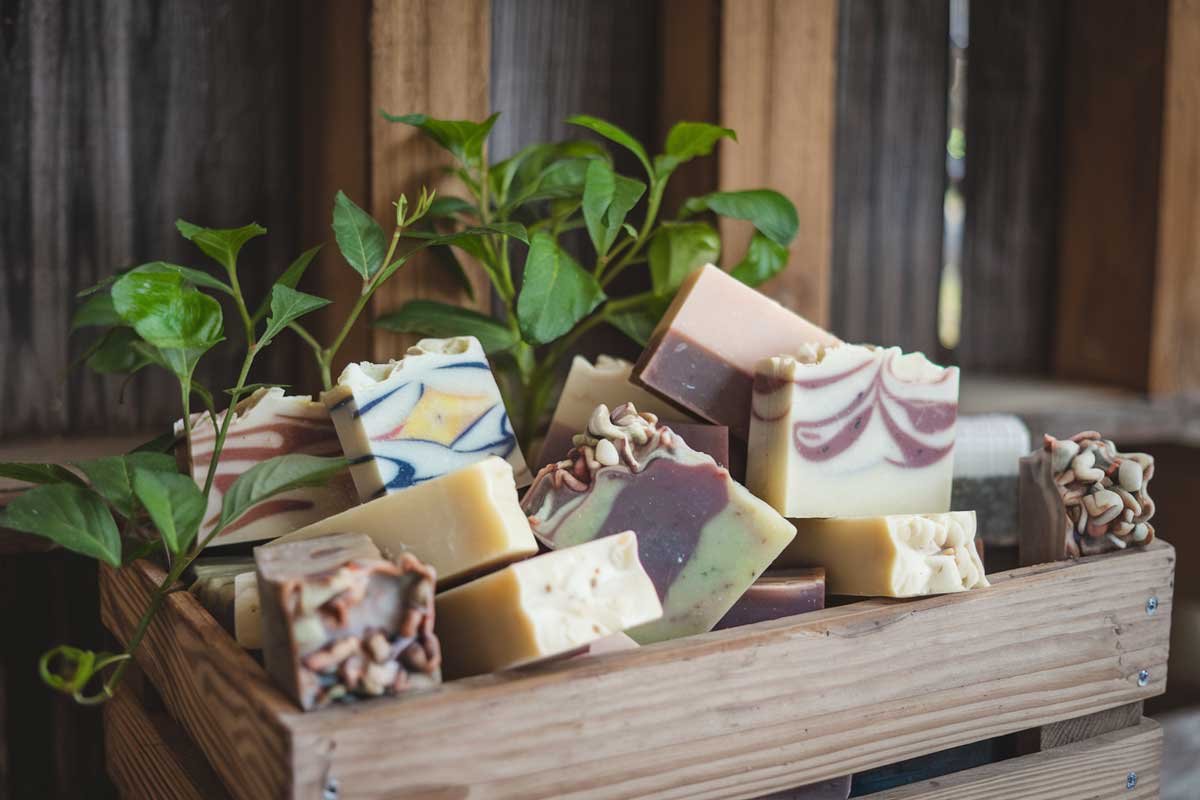
Many beliefs about soap aren’t backed by facts. Let’s clear up some common misunderstandings about both handmade and commercial soaps to help you make better choices for your skin.
True Nature of Handmade Soap
Contrary to popular belief, not all handmade soaps are created equal. While most are made with natural ingredients, the term “handmade” doesn’t automatically mean “organic” or chemical-free. Always check ingredient lists.
Some people think handmade soap isn’t as effective as antibacterial soap, but this is false. Traditional soap cleans through its natural chemical process, binding to dirt and washing it away without harsh chemicals.
Another myth is that handmade soap expires quickly. In fact, properly cured natural soap often lasts longer than you might expect. The aging process can actually improve many handmade soaps, making them harder and longer-lasting.
Commercial Soap Misunderstandings
Many commercial “soaps” aren’t actually soap at all. They’re synthetic detergents labeled as beauty bars or cleansing bars. This isn’t necessarily bad, but it’s important to understand what you’re buying.
Not all artificial ingredients are harmful. While some synthetic fragrances and artificial colors may cause irritation for sensitive skin, many are thoroughly tested and safe for most people.
The biggest misconception? That commercial soaps are all identical. The truth is there’s a wide range of quality among mass-produced options. Some contain beneficial ingredients while others focus on cost-cutting.
Price doesn’t always indicate quality either. Some affordable commercial options outperform expensive ones. What matters most is finding ingredients that work for your specific skin type and needs.
Advantages of Handmade Soap
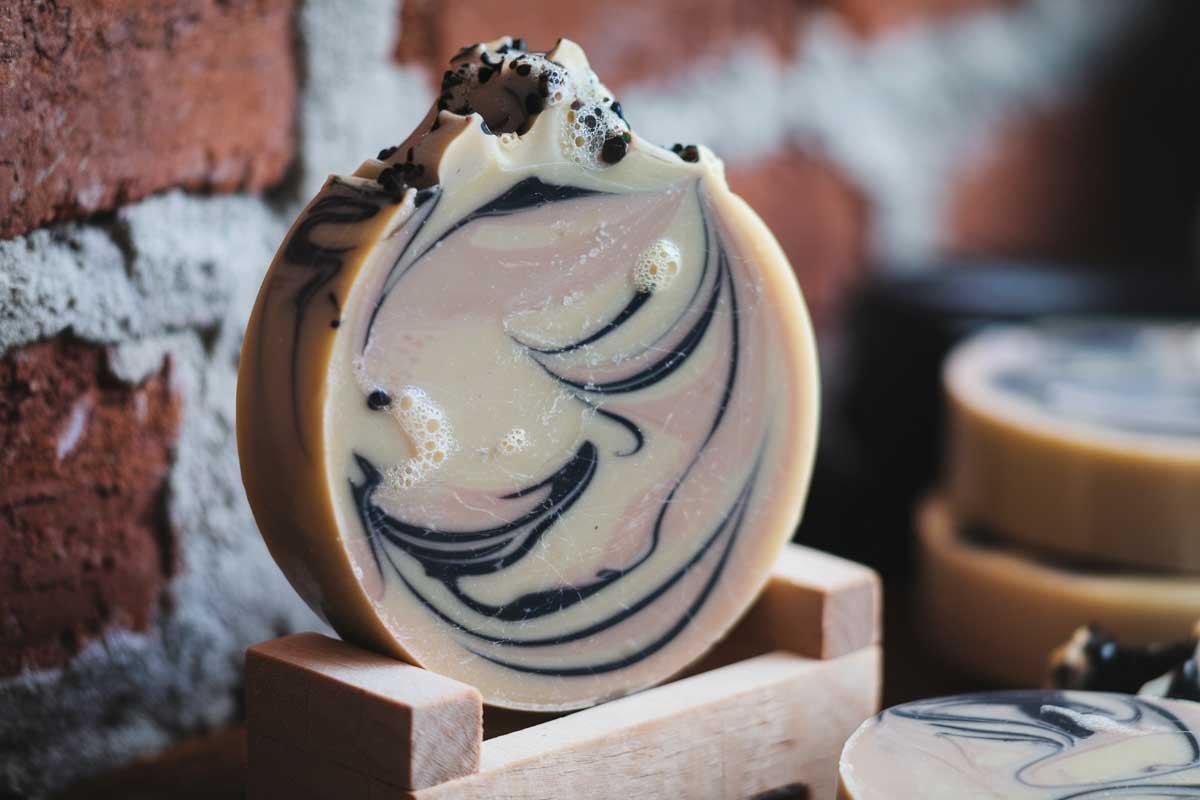
Handmade soap offers benefits that mass-produced alternatives simply cannot match. These soaps provide better care for your skin while supporting ethical practices and offering unique, personalized experiences.
Enhanced Skin Benefits
Handmade soap contains natural ingredients like coconut oil and olive oil that nourish your skin. Unlike commercial soaps, they retain glycerin—a natural byproduct of the soap-making process that moisturizes skin.
Most handmade soaps avoid harsh chemicals such as:
- Sodium lauryl sulfate (SLS)
- Parabens
- Artificial fragrances
- Synthetic dyes
These gentle formulations make handmade soap ideal for sensitive skin types. The superior ingredient quality helps address skin conditions like eczema and psoriasis without causing irritation.
Botanical extracts in handmade soaps provide additional therapeutic benefits. Ingredients like lavender calm irritated skin, while tea tree offers antibacterial properties.
Your skin will feel the difference immediately. Many users report less dryness and improved skin texture after switching to handmade options.
Supporting Sustainable Practices
Handmade soap producers typically embrace eco-friendly practices in their manufacturing process. Small-batch production reduces energy consumption and carbon footprint compared to large commercial operations.
Many artisan soap makers use local, organic ingredients and avoid palm oil—an ingredient linked to deforestation. This approach supports sustainable agriculture and biodiversity.
Packaging for handmade soaps tends to be minimal or recyclable. You’ll often find these products in paper wrapping rather than plastic containers, reducing waste.
By purchasing handmade soap, you support small businesses with ethical practices. Your choice contributes to a more sustainable economy that values quality and environmental responsibility over mass production.
Customization and Artisanal Craftsmanship
Handmade soaps offer unmatched variety in scents, colors, and ingredients. Each bar represents the unique vision of its creator, making it a personal expression rather than a factory product.
You can find soaps tailored to your specific needs:
- Skin type: Formulations for dry, oily, or combination skin
- Preferences: Fragrance-free options or specific natural scents
- Special needs: Extra-gentle formulations for babies or those with allergies
The personalized experience extends to appearance as well. Handmade soaps feature artistic designs, marbling effects, and embedded botanicals that make them visually appealing.
Artisan soap makers take pride in their craft, often using techniques passed down through generations. Each batch receives careful attention during mixing, molding, cutting, and curing processes that can take weeks to complete.
Support for Small Businesses and Local Economies
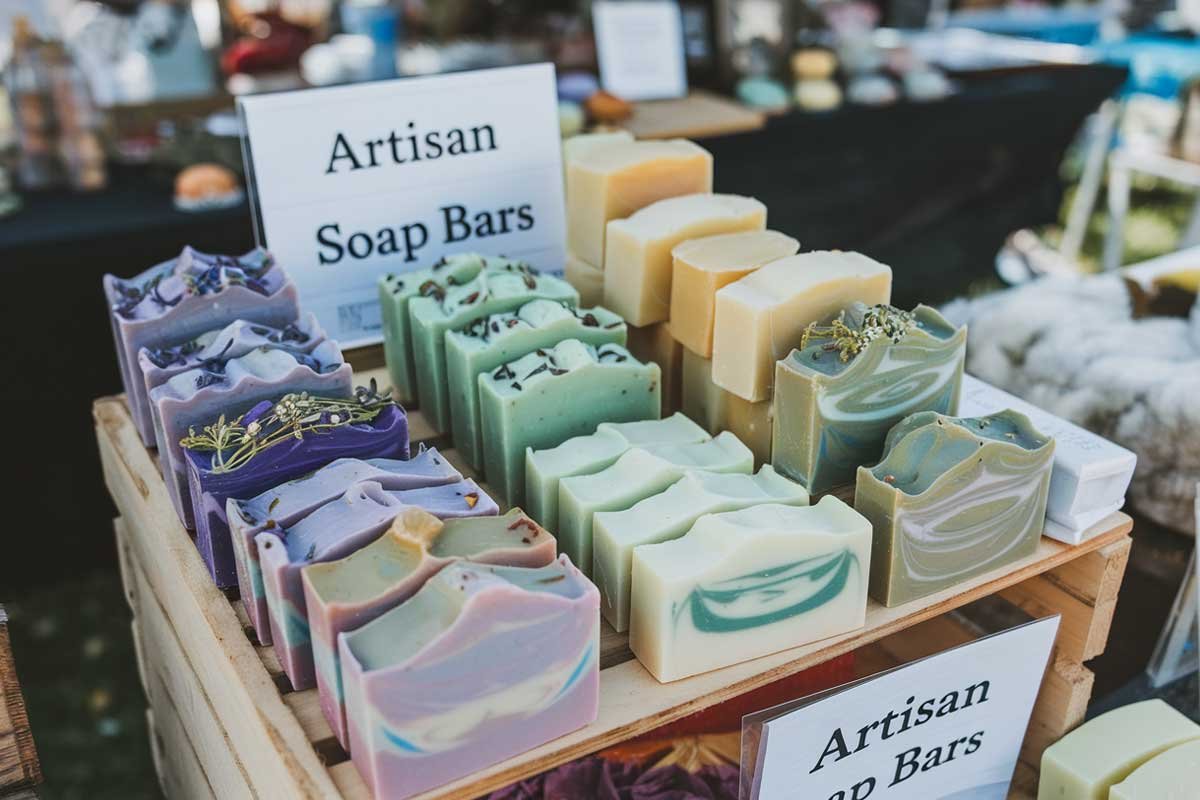
When you choose handmade soap, you’re not just buying a personal care product. You’re directly supporting local artisans and small businesses who pour their passion and expertise into creating quality products.
Unlike commercial soaps made in massive factories by corporations, handmade soaps come from small operations. These are often family-run businesses where each bar is crafted with attention to detail and care.
Your purchase makes a real difference in your local economy. Money spent with small soap makers typically stays within your community, creating a positive economic ripple effect.
Benefits of supporting small soap businesses:
- Creates jobs in your local area
- Promotes sustainable business practices
- Encourages entrepreneurship and innovation
- Builds stronger community connections
Many artisan soap makers offer customization options that big companies simply cannot match. You can often request specific ingredients, scents, or designs tailored to your preferences.
This personalized approach extends to customer service too. Small business owners typically provide more attentive service and are eager to answer your questions about their products.
Community support flows both ways in the handmade soap world. Many soap artisans participate in local markets, fairs, and workshops that enrich community life and create gathering spaces for neighbors.
By choosing handmade soap, you help preserve traditional craftsmanship and skills that might otherwise disappear in our mass-production economy.


